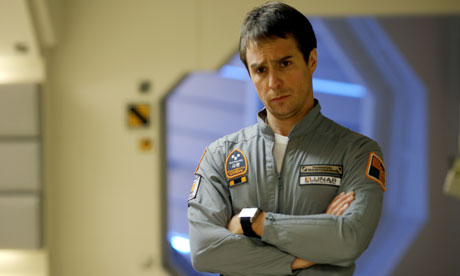
As the second film from the director of a low-budget sleeper hit now working with a large sum of money, Duncan Jones's Source Code has the perfect profile for a spirit-sapping let down, a CGI-laden kick in the shins. But in fact, the only small disappointment I felt about it was how its four leading actors represented a departure from the makeup of Jones's debut Moon – which apart from the occasional appearance from the likes of Matt Berry, was essentially a one-man show (that man the tireless Sam Rockwell).
Not that Jones has completely abandoned the single-character motif – amid Source Code's exploding trains and homages to The Manchurian Candidate, chunks of the story find a lone Jake Gyllenhaal hunched in a dingy airtight receptacle, that image at least providing a link to Moon's scenes of a lunar-marooned Rockwell. And, as such, also to the unlikely flowering of the other one-actor set pieces that have sprung up in recent months – Danny Boyle's 127 Hours and the much talked-about Buried each being de facto solo performances, joining a tiny, but madly diverse sub-genre along with the likes of the late Spalding Gray's Swimming to Cambodia and Andy Warhol's five-hour "anti-film" Sleep.
Of course, were we to nitpick, then only Buried of the recent batch genuinely features just one actor from opening to closing credits, but in all three cases nothing about the story relies on the dramatic spark provided by another human being. It's a neat party piece, conjuring up incident without even the modest support of, say, the unseen, but endlessly menacing truck driver that gave Steven Spielberg's 1971 debut Duel a jolting adrenal charge despite Dennis Weaver almost always being the only face on screen.
But without those kinds of external threats, the sad gnaw of solitude quickly sets in, a deep-seated melancholy infusing the solo-act-in-space that was Silent Running, the eco-conscious preface to Moon. Or the melancholy turns to toxic self-pity, as in Robert Altman's Secret Honor, with Phillip Baker Hall indelibly brilliant as a curdled Richard Nixon knocking back scotch and spitting bile while stumbling alone down memory lane. Oddly, though, in a mini-genre that's experimental by its very nature, it was one of Hollywood's most fuddy-duddy directors, Robert Zemeckis, who conjured up the most powerful recent single-actor-yarn in 2000's Cast Away, a film that mined a rich vein of grinding existential loneliness as Tom Hanks's stranded everyman tried to make sense of a world with only a volleyball for company.
Which is notable, I think, because grinding existential loneliness isn't the kind of thing cinema tends to go in for. Hence the enduring interest in Film, the one script written for the screen by the master of just that, Samuel Beckett – a terse vision of an old man desperate to avoid the gaze of the world, played by a broken-down Buster Keaton, for nearly all the 26-minute running time the only character in sight. In truth, the result is a curiosity rather than a masterpiece, but there's still something haunting about Keaton's time-worn presence, as well as a real poignancy to the fact he and Beckett, surely potential kindred spirits, failed to find two words to say to one another while making it.
But then the interaction of two people (or the lack of it) is the stuff of a whole other post and a whole other genre – that of great two-handers such as Hell in the Pacific, Sleuth, Joseph Losey's gripping Figures in a Landscape, the sadly underrated Gerry. They will have to wait for another time. By then, given the new economics of the film industry, we may have plenty more one and two-actor movies to discuss – in our age of empty pockets, minimalist casting may yet prove the budget-stretching shape of things to come ...

